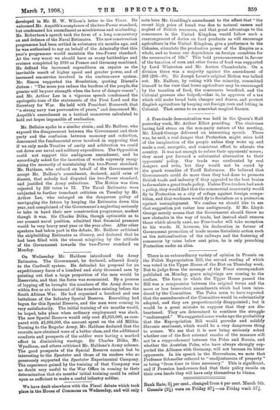There is an extraordinary variety of opinion in Prussia on
the Polish Expropriation Bill, the second reading of which was voted in the Upper House of the Diet on Thursday week. But to judge from the message of the Times correspondent published on Monday, grave misgivings are coming to the surface. The form in which the Upper House passed the Bill was a compromise between the original terms and the more or less benevolent amendments which had been intro- duced by the Committee. The Poles seem to have expected that the amendments of the Committee would be substantially adopted, and they are proportionately disappointed ; but it would be a great mistake to suppose that they are dis- heartened. They are determined to continue the struggle " undismayed." We suggested some weeks ago the probability that the Expropriation Bill would provoke and solidify Slavonic sentiment, which would be a very dangerous thing to arouse. We see that it is now being seriously asked whether one of the first external results of the measure will not be a rapprochement between the Poles and Russia, and whether the Austrian Poles, who have always strongly sup- ported the Alliance with Germany, will not become its bitter opponents. In his speech in the Herrenhaus, we note that Professor Schmoller referred to "readjustments of property" as being "from time to time necessary." This is significant, and if Prussian landowners find that their policy recoils on their own heads they will have only themselves to blame.














































 Previous page
Previous page